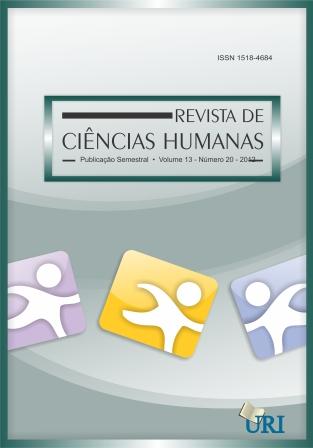A RELAÇÃO ENTRE TRABALHO E ESTUDO: UMA REFLEXÃO SOBRE AS ESTUDANTES DOS CURSOS NOTURNOS DE PEDAGOGIA /THE RELATIONSHIP BETWEEN WORK AND STUDY: A REFLECTION ON PEDAGOGY STUDENTS FROM THE NIGHT SHIFT
DOI:
https://doi.org/10.31512/rch.v13i20.353Palavras-chave:
ensino superior. Ttrabalhador/estudante. Política públicaResumo
Este artigo apresenta as conclusões de pesquisa “Da relação trabalho e estudo do trabalhador/estudante do ensino superior noturno do curso de Pedagogia”, realizada junto a alunas de duas instituições privadas, a Pontifícia Universidade Católica de Goiás, com 42 estudantes participantes, e a Faculdade Alves de Farias, com 55 estudantes participantes. Recorreu-se ao materialismo histórico dialético como método, tendo por pressuposto a relação ativa entre sujeito e objeto na construção do conhecimento científi co, o que nos permitiu interpretar as contradições das implicações da relação existente entre as políticas públicas e as condições do trabalhador/estudante deste nível de ensino. Para tanto, adotou-se uma abordagem quantiqualitativa no processo investigativo e no tratamento das informações. O processo de sistematização, interpretação e análise dos dados teve por fundamento os conhecimentos teóricos de Karl Marx (2008), Lúcia Bruno (1996) e Mariano Enguita (1993). Buscou-se desvelar a relação entre trabalho e estudo em tempos de “neo” liberalismo, como também questionar se o trabalhador estudante opta pelo curso de Pedagogia ou se essa opção é uma imposição de classe. Concluiu-se que persiste a necessidade de repensar a forma de acesso, a formação e a conclusão do ensino superior quando tempo de trabalho e de estudo são conciliados, pois frequentar um curso nem sempre desejado, depois de uma longa jornada de trabalho, pagar por uma formação que, em muitos casos, tem sua qualidade questionada confi gura uma conquista social parcial.
*
ABSTRACT: This article presents the conclusions of the research “The relationship between work and study of the worker/student from the Pedagogy student in the night shift”, held in the Pontifical Catholic University of Goiás with 42 participant students and in Faculdade Alves de Farias with 55 participant students. We resorted to the dialectical historical materialism as a method, with the assumption of the active relationship between subject and object in the construction of the scientifi c knowledge, which allowed us to interpret the contradictions of the implications in the existing relationship between public policies and the worker/ student conditions in this level of education. We adopted a quantiqualitative approach in the investigative process and the processing of information. The processes of systematization, interpretation and analysis of the data were substantiated on the theoretical knowledge of Karl Marx (2008), Lúcia Bruno (1996) and Mariano Enguita (1993). It was sought to uncover the relationship between work and study in the periods of “neo” liberalism, as well as to question if the worker student willingly chooses to course Pedagogy or if this choice is imposed by class. It was concluded that there is a persistence in the need to rethink the means of access, formation and conclusion in higher education courses when work and study are conciliated, since attending to a course that may be undesired after long working hours, and paying for an academic formation that in many cases has a questionable quality, translates into a partial social achievement.
Publicado
Como Citar
Edição
Seção
Licença
O trabalho Revista de Ciências Humanas de Revista de Ciências Humanas foi licenciado com uma Licença Creative Commons - Atribuição 4.0.
Podem estar disponíveis autorizações adicionais ao âmbito desta licença em http://revistas.fw.uri.br/index.php/revistadech.

